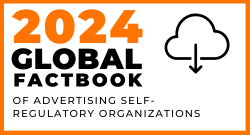Advertising standards and Corporate Social Responsibility
Responsible advertising is an important element of Corporate Social Responsibility (CSR). Companies committed to CSR look at the impact of their activities on all aspects of society including economic, environmental, social and cultural aspects. Concretely, CSR means that companies must consider this impact across all their segments and activities, whether IT, operations, sales, human resources, or marketing.
A shared goal: promoting responsible business practices
Self-regulatory advertising standards, like CSR intiatives, aim at promoting responsible business practices, based on a global, principles-based framework implemented at national (and regional) level.
Thanks to advertising Self-Regulatory Organizations (SROs), companies can collectively manage their responsible marketing commitments, notably by developing and enforcing self-regulatory advertising standards.
In a new paper published on 26 September 2019, ICAS provides some concrete examples to illustrate the link between advertising standards and CSR. These include “pledges” promoting healthy eating habits, the oversight of environmental claims, company certifications, as well as the special case of the Broad Based Black Economic Empowerment (BEE) policy in South Africa.
Advertising standards in CSR reporting
Importantly, the Global Reporting Initiative (GRI) has issued widely adopted standards for CSR reporting which include, among others, references to marketing and labeling practices of companies. Going forward, ICAS is keen to initiate a discussion on ways these references could be improved to better take into account the performance of companies vis-à-vis applicable advertising standards.
For instance, the degree to which a company adheres to advertising standards and advertising self-regulation systems could be reflected by a new indicator specifying:
- whether the company is member of, or otherwise supports, SROs in the different markets in which it operates;
- the compliance rate of the company as a result of industry-wide monitoring exercises;
- the number of complaints on the ads and other marketing communications of the company received by SROs in the relevant reporting year;
- the level of compliance with SRO decisions (e.g. when an ad needs to be amended or removed).
Information on the use of preventive measures such as pre-clearance and copy advice may also be usefully included in CSR reports.
To find out more, read the full ICAS paper on advertising standards and corporate social responsibility.

